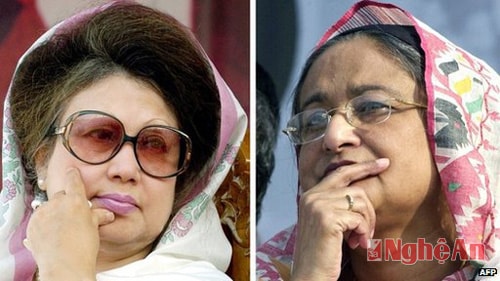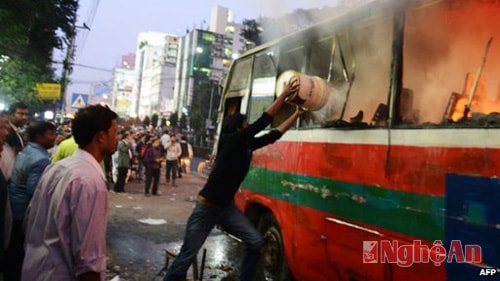Bangladesh Elections: Violence Escalates
(Baonghean) - Right before the parliamentary elections taking place today (January 5), at least 30 polling stations in Bangladesh were burned down by voters of the Bangladesh Nationalist Party (BNP). This is the latest development in a series of protests and boycotts of the election, initiated by Ms. Khaleda Zia, leader of the BNP.
(Baonghean) - Right before the parliamentary elections taking place today (January 5), at least 30 polling stations in Bangladesh were burned down by voters of the Bangladesh Nationalist Party (BNP). This is the latest development in a series of protests and boycotts of the election, initiated by Ms. Khaleda Zia, leader of the BNP.
It has been two days since protests began against what police and election officials say is a “scandalous farce” of an election. At least 100 people have been killed in a week of violence, according to police and election officials. At least 30 polling stations across the country have been set on fire, including in the capital Dhaka. Some reports have even gone as high as 60. Three of the polling stations, mostly in schools and government buildings, have been moved to new locations, according to Mohammad Abdullah, the chief minister of the southeastern province of Chittagong. The move was swift, ensuring that the vote went ahead on time despite opposition disruptions. The violence escalated after protesters threw a petrol bomb through the window of a train in the northwestern town of Natore. Police said at least 12 people were killed in the incident, as well as multiple attacks on buses and the burning of civilians with petrol bombs.
 |
| Two leaders Khadela Zia (left) and Sheikh Hasina (right). |
All of the above acts of violence were intended to “illustrate” the general election boycott by the BNP (and some other opposition parties). It is known that the opposition demanded the formation of a neutral interim government responsible for supervising the election, but the current Awami government of Prime Minister Sheikh Hasina refused. In fact, elections in Bangladesh have always been under the supervision of a caretaker government since 1991. This system was abolished by the Awami government in 2010 thanks to the 2/3 majority of seats that the party held in the National Assembly, on the grounds that maintaining this system was unnecessary. The BNP said that it was simply to make it easier for the ruling party to rig votes and cheat in the election. That is why BNP announced that they will not participate in this election, which means that 153/500 seats in the National Assembly have been won because there is only one candidate, and the election will take place to decide the remaining 147 seats. However, with the absence of major opposition parties, the choice for voters is really not much.
However, escalating the violence to such a level seems more a sign of radicalism than a struggle for democracy. It is not surprising that the “ally” joining hands with the BNP this time is the Islamist party Jamaat-e-Islami. Jamaat has initiated many violent movements in recent years to impose its ideology, attacking and killing government security personnel. This time, Jamaat joined hands with the BNP to initiate attacks, sabotage, blockades of roads, railways, waterways and closures of shops, schools and offices.
To galvanize voters, Khadela Zia accused the Awami government of placing her under house arrest, which the government denied. According to the government, the Jamaat, most of whose leaders have been tried for crimes against humanity during the country's 1971 war of independence. Four of them have been sentenced to death and one was hanged last month. Coupled with the fear of being destroyed by the current government, backed by India, the party is believed to be seeking revenge by abolishing the war tribunal. That is why the Awami government has called on the BNP to cut all ties with Jamaat and not include the issue of the war tribunal in its election program.
 |
| Protesters are accused of setting buses on fire during an election boycott. |
It seems that the election results will not be surprising, with the prediction that Awami will continue to hold power almost certainly. A special envoy sent by UN Secretary General Ban Ki Moon last month to help the two sides negotiate and resolve the conflict has not produced any results. Both the US and the UK have refused to send special observers, raising further doubts about the fairness of the election. Because even if Awami declared victory, many sources still believe that BNP could have come to power if the election had been open and transparent. So what everyone is concerned about is what will happen after the election? Will Awami put the country in a state of emergency and implement harsh measures to preempt the opposition parties? To be fair, the police have also shot and killed many opposition protesters. It is difficult to say who is going against the democratic declaration here, when each side has its own "cheating tricks"...
“When buffaloes fight, flies die,” the result of the two-decade-long, still-unresolved power struggle between Khadela Zia and Sheikh Hasina is a Bangladesh of violence, instability and a full-blown economic crisis. The 50,000 troops deployed across the country to ensure election security have not reassured the people. Hazera Begum, a voter in the capital Dhaka, told the Associated Press: “I really want to vote but I am afraid of violence. If things return to normal and my neighbors go, maybe I will.” Awami comes to power and stabilizes the country? Maybe, just maybe!
Ganoderma






